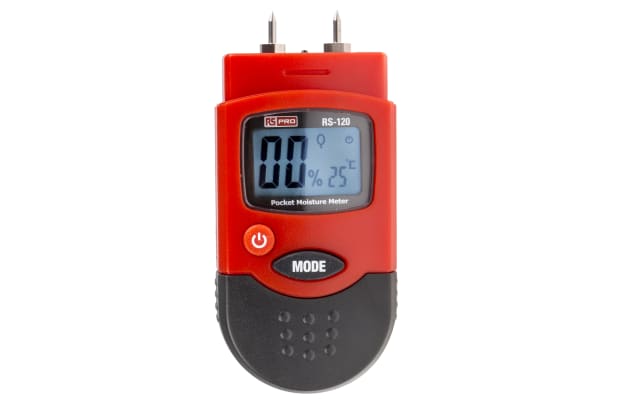The Ultimate Guide to Moisture Meters: A Comprehensive Summary and How They Can Save You Money
Moisture meters serve as crucial tools in spotting and checking moisture web content in products, assisting in stopping costly problems and making sure the top quality of products. Comprehending the nuances of various kinds of dampness meters, their applications, and the possible cost-saving advantages they use can be a game-changer for services and experts alike.
Sorts Of Dampness Meters
Various types of dampness meters are offered for various applications in various industries. One common type is the pin-type dampness meter, which measures the electric resistance between 2 pins placed right into a product. This type is suitable for timber, drywall, and other building products. Pinless dampness meters, on the various other hand, use electro-magnetic sensor plates to scan a larger area without causing damages to the product's surface area. Moisture Meter. These meters are optimal for promptly examining wetness degrees in big areas such as floorings and wall surfaces.

Infrared moisture meters gauge the thermal buildings of a product to determine its dampness content non-invasively, making them beneficial for applications where pin or pinless meters may not be ideal. Recognizing the different types of dampness meters readily available can help industries select the most proper tool for their certain wetness dimension needs.

Benefits of Using Wetness Meters
Wetness meters supply invaluable advantages in precisely analyzing and checking moisture levels in varied products and settings. One of the primary benefits of using moisture meters is the prevention of potential damage created by excess wetness.
Moreover, using dampness meters can lead to enhanced power efficiency. In farming settings, moisture meters play an important duty in maximizing plant yields by enabling farmers to monitor soil moisture levels and make informed watering choices.
Exactly How to Select the Right Wetness Meter
Selecting the appropriate moisture meter includes taking into consideration key variables such as material compatibility, measurement array, and calibration accuracy. When picking a wetness meter, it's important to guarantee that the meter is appropriate for the details product you will be screening. Various products have differing electric properties that can impact moisture readings, so picking a meter created for your product is important for precise results. Additionally, take into consideration the dimension variety of the dampness meter. Make certain that the meter can identify moisture levels within the variety needed for your applications. Calibration accuracy is an additional crucial element to bear in mind. Go with a wetness meter with trustworthy calibration to ensure consistent and precise readings. Some meters might call for periodic calibration modifications, so understanding the calibration procedure is essential. By meticulously assessing these elements, you can pick a moisture meter that satisfies your requirements and supplies precise moisture measurements for your jobs.
Correct Strategies for Wetness Meter Use

Cost Cost Savings With Wetness Meter Applications
Just how can the strategic utilization of wetness meters cause substantial cost financial savings throughout different industries? Dampness meters play a vital function in price savings by avoiding prospective damage and ensuring top quality control in various sectors. In the agriculture industry, dampness meters aid in figuring out the ideal time for harvesting plants, avoiding excess or over-drying moisture that can influence the last item's quality. This specific surveillance aids farmers avoid unnecessary losses and maximize their return.
Similarly, in building and construction, dampness meters aid stop pricey damages by spotting moisture levels in structure materials, such as timber or concrete, which can result in structural concerns if not resolved quickly. By determining trouble areas beforehand, specialists can take rehabilitative steps to stay clear of considerable repair work or replacements, eventually saving money and click here for more info time.
Additionally, in the food handling industry, wetness meters are important for monitoring item high quality and making sure conformity with security regulations. By accurately gauging wetness material in food items, manufacturers can prevent putridity, keep quality, and decrease waste, causing significant cost savings. In general, the strategic application of dampness meters is a beneficial investment that can result in substantial expense decreases and improved performance across different sectors.
Final Thought
In verdict, dampness meters are important devices for spotting and determining dampness levels in different materials. By utilizing the right moisture meter and adhering to proper methods, individuals can effectively avoid pricey damages caused by excess dampness. Purchasing a high quality wetness meter can cause significant price financial savings over time by determining prospective problems at an early stage and enabling prompt remediation. Inevitably, wetness meters are vital tools for keeping the honesty and durability of structures and products.
Wetness meters serve as essential tools in finding and keeping track of moisture content in materials, helping in avoiding expensive damages and making sure the top quality of items. Infrared moisture meters measure the thermal properties of a product to determine its wetness web content non-invasively, making them helpful for applications where pin or pinless meters may not be appropriate.Wetness meters provide invaluable benefits in precisely evaluating and checking wetness degrees in diverse materials and atmospheres. In agricultural setups, moisture meters play a critical duty in optimizing crop returns by making it possible for farmers to check dirt dampness degrees and make informed watering decisions.In verdict, moisture meters are useful tools for measuring and identifying moisture levels in different products.
Comments on “Leading 10 Benefits of Using a Moisture Meter for Definite Measurements in your house”